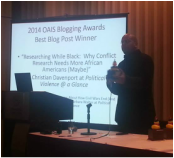
Now, I mention this because although I was clear on what I wanted to do and be my junior year in college, I made the mistake of going to Binghamton University. No offense to the school intended. They covered me completely for 4 years with no greater responsibility than maintaining an A average and after figuring things out a little, I managed to get a very good beginning to my education. Things have continued since this time.
So, Binghamton was a mistake not because of the school itself but because of how people in the profession viewed the University and because I could have gone to a better ranked school but did not. I didn't know it mattered. I thought that I just needed to pursue my interests and the rest would work itself out. How naive I was.
Binghamton trained me to get a job but at every turn on the job market and frankly for years afterward, I got questioned like it was comps. Now, I have been around long enough now to understand how interviews go when you want the candidate and believe that they will be a major addition. This I did not get. In fact, I would argue that I got second guessed a great deal. There was the lunch with Charles Franklin and Andy Sobel at my Washington University interview when I barely had a chance to eat as they asked me questions about analyzing time series data. John Sprague continued grillings over coffee and seemingly every other passing in the hall. I don’t think that I would have gotten this grilling had I been from Princeton or Yale as this is where everyone there seemed to have their degree from. This is all just speculation of course but the second guessing because of affiliation thing is not just a thing of the past however. One faculty member at the University of California at San Diego a year ago (when I was considering a job there) asked me “so, I have been meaning to ask: why Binghamton University?” This is twenty years after I graduated from the place. Who cares where I went to school? Well, evidently this faculty member cared and I think there are many out there that share the opinion.
My point. In the past day or so a handful of prominent bloggers, who happen to hold degrees from political science programs ranked more highly than Binghamton's have been talking about networking at meetings (see here, here, and here). Well, in my experience good work does not just speak for itself, so I thought I'd offer my thoughts.
Good ideas and good work go far in this business and this is basically the baseline from which everything happens. At the same time, if you have that but no quality mentorship (people telling you whats up and down to your face) or, more importantly, sponsorship (people acting on your behalf with you not having a clue), then there is only but so far you can go. These people are advisors, mentors, sounding boards but also letter writers, people who recommend you to funders and publishers. These people are your lifeblood. As the saying goes: it takes a village and, folks, these are your villagers. Treat them well.
So, should you go to APSA to “network”? F yeah!! Coming out of Binghamton I did not have access to heavy hitters in my chosen area – a more comparative take on conflict and contentious politics, like Ted Gurr and Charles Tilly (my interview at the University of Houston explicitly revealed that they wanted someone that did “Ted Gurr like stuff”). I had to meet these people on my own and I did this at conferences as well as workshops.
Gurr I met at one APSA meeting following a session on the LA riots. Yes, I went to the meeting specifically for this purpose. I sat the whole panel nervously debating whether I should approach him or Doug Mcadam (another important scholar in the area). I came to the session ready. I had a cover letter, my vitae, and three unpublished papers. After the session, I “bumrushed” him: introduced myself, said something clever and then handed him my packet. It was not brief. We talked for long enough that Will Moore (who I would meet later and who was accompanying Gurr) sat down, realizing that this could take a while.
The connection was essential. Gurr helped me get an interview and probably job at the University of Maryland, he allowed me to briefly run Minorities at Risk, he introduced me to individuals at the Political Instability Task Force (who later offered me a job to run their project on genocide) and he served as a letter writer, advisor and probably reviewer more times then I know.
I met Charles Tilly more or less the same way. To meet Chuck I traveled to New York from Washington DC every other week and bumrushed a workshop that he ran out of Columbia. I just started showing up and engaging. This has been suggested by others as part of the “do good work” suggestion. I also started meeting with him for coffees and conversation which helped me grow tremendously. Not only did Chuck give amazing advice but he sent people my way as an "expert", he wrote letters, he read everything as well as everybody and he inspired me to not only continue to follow the party I had chosen but to do my best to be the best scholar I could. Perhaps the smartest human being I met personally suggested that I was not an idiot and that I should continue. This might not sound like much but this always meant a great deal to me.
Later I became a bit more strategic with my networking. I picked 5 people whose work I admired and invited them to coffee or a drink. These folks were not all heavy hitters. I looked for kin, fellows, my peeps. Never start with a meal, I thought. We would talk about what they were working on and for a few minutes I would discuss what I was doing. I would later hand them a paper or later a cd (remember them?) or later a digicard (sleep on this innovation?) or later still a flashdrive or invitation to a dropbox folder. Sometimes it worked out and I got some important feedback. Sometimes it did not. Sometimes I just got to share with someone that I really enjoyed their work and got to hear how they thought as well as get a sense of how they did what they did. Sometimes I made a new friend. Sometimes I didn’t. All good though. The contact with other scholars, other humans similarly engaged, brought the vocation/calling back to life for me. I am now renewed by every experience, every conversation. This is something else I got from Tilly. A love for the interaction that accompanies what we do. We might be geeks but geeks need some love and some communion as well (wasn’t this the point of those movies in the 1980s and 1990s about nerds?).
Now, perhaps the gripe against networking is that it makes us sound careerist and overly-strategic, but so what. The academic market is not a nice place and tenure-track jobs are not falling from the trees – at least not for those who are not from the elite institutions in the US (which is the majority of the population). This is especially the case now. You might be able to tweet, skype, email, instagram and viber with folks all over the planet but when it comes down to it three to four people in a room are going to make a decision about you that could influence several years to the rest of your life. Every little bit of information they can get about you could help your case – especially when you are not from a top institution. And one piece of information that might turn the tide is contained in that little interaction you had with someone at some panel, some reception or some small conversation after a business meeting.

 RSS Feed
RSS Feed
